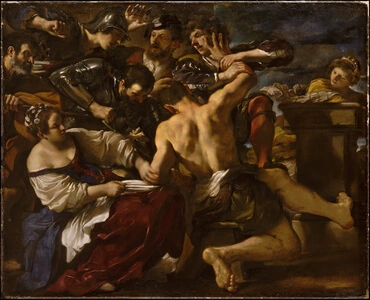1
La parole de l'Eternel qui fut [adressée] à Jérémie le Prophète contre les nations.
2
A l'égard de l'Egypte, contre l'armée de Pharaon-Neco Roi d'Egypte, qui était auprès du fleuve d'Euphrate, à Carkémis, laquelle Nébucadnetsar Roi de Babylone défit en la quatrième année de Jéhojakim, fils de Josias Roi de Juda.
3
Préparez le bouclier et l'écu, et approchez-vous pour la bataille.
4
Attelez les chevaux, et [vous] cavaliers, montez; présentez-vous avec les casques, fourbissez les lances, revêtez les cuirasses.
5
D'où vient que je vois [ceci]? Ils sont effrayés; ils tournent en arrière; leurs hommes forts ont été défaits, et s'enfuient avec précipitation, sans regarder derrière eux; la frayeur les environne, dit l'Eternel.
6
Que l'homme léger à la course ne s'enfuie point, et que le fort ne se sauve point; ils sont renversés et tombés vers l'Aquilon, auprès du rivage du fleuve d'Euphrate.
7
Qui est celui-ci qui s'élève comme une rivière, et duquel les eaux sont émues comme les fleuves?
8
C'est l'Egypte; elle s'élève comme une rivière, et [ses] eaux s'émeuvent comme les fleuves; et elle dit : je m'élèverai, je couvrirai la terre, je détruirai les villes, et ceux qui y habitent.
9
Montez chevaux, agissez en furieux, [venez] chariots, et que les hommes forts sortent : ceux de Cus et de Put qui manient le bouclier, et les Ludiens qui manient [et] bandent l'arc.
10
Car c'est ici la journée du Seigneur l'Eternel des armées, journée de vengeance, pour se venger de ses adversaires. L'épée dévorera, et elle sera rassasiée [et] enivrée de leur sang; car il y a un sacrifice au Seigneur l'Eternel des armées dans le pays de l'Aquilon, auprès du fleuve d'Euphrate.
11
Monte en Galaad, et prends du baume, vierge fille d'Egypte. En vain emploies-tu remède sur remède; car il n'y a point de guérison pour toi.
12
Les nations ont appris ton ignominie, et ton cri a rempli la terre; car le fort est tombé sur le fort, et ils sont tombés tous deux ensemble.
13
La parole que l'Eternel prononça à Jérémie le Prophète touchant la venue de Nébucadnetsar Roi de Babylone, pour frapper le pays d'Egypte :
14
Faites savoir en Egypte, et publiez à Migdol, à Noph, et à Taphnés; [et] dites : présente-toi, et te tiens prêt; car l'épée a dévoré ce qui est autour de toi.
15
Pourquoi chacun de tes vaillants hommes a-t-il été emporté? il n'a pu tenir ferme, parce que l'Eternel l'a poussé.
16
Il en a terrassé un grand nombre, et même chacun est tombé sur son compagnon, et ils ont dit : lève-toi, retournons à notre peuple, et au pays de notre naissance, loin de l'épée de l'oppresseur.
17
Ils ont crié là, Pharaon Roi d'Egypte n'est que bruit; il a laissé passer le temps assigné.
18
Je suis vivant, dit le Roi dont le Nom est l'Eternel des armées, que comme Tabor [est] entre les montagnes, et comme Carmel [est] dans la mer, [ainsi] viendra-t-il.
19
Ô fille habitante de l'Egypte, équipe-toi pour déloger, car Noph sera désolée, et rendue déserte, sans qu'[il y ait] plus d'habitants.
20
L'Egypte est une très belle génisse; [mais] la destruction vient, elle vient de l'Aquilon.
21
Même les gens de guerre qu'elle entretient chez elle à ses gages, sont comme des veaux engraissés, car aussi ont-ils tourné le dos; ils s'en sont fuis ensemble, ils n'ont point tenu ferme, parce que le jour de leur calamité, le temps de leur punition est venu sur eux.
22
Elle sifflera comme un serpent, car ils marcheront avec une puissante [armée], et ils viendront contre elle avec des cognées, comme des bûcherons.
23
Ils couperont sa forêt, dit l'Eternel, quoiqu'on n'en pût compter [les arbres]; parce que [leur armée sera] en plus grand nombre que les sauterelles, et on ne saurait la compter.
24
La fille d'Egypte est rendue honteuse, elle est livrée entre les mains du peuple de l'Aquilon.
25
L'Eternel des armées, le Dieu d'Israël, a dit : voici, je m'en vais punir le grand peuple de No, et Pharaon, et l'Egypte, et ses dieux, et ses Rois, tant Pharaon, que ceux qui se confient en lui.
26
Et je les livrerai entre les mains de ceux qui cherchent leur vie, entre les mains, dis-je, de Nébucadnetsar Roi de Babylone, et entre les mains de ses serviteurs; mais après cela elle sera habitée comme aux temps passés, dit l'Eternel.
27
Et toi Jacob mon serviteur, ne crains point, et ne t'épouvante point, toi Israël; car voici, je m'en vais te délivrer du pays éloigné; et ta postérité, du pays de leur captivité; et Jacob retournera, et sera en repos et à son aise, et il n'y aura personne qui lui fasse peur.
28
Toi donc, Jacob mon serviteur, ne crains point, dit l'Eternel; car je suis avec toi; et même je consumerai entièrement toutes les nations parmi lesquelles je t'aurai chassé; mais je ne te consumerai point entièrement, et je te châtierai par mesure; toutefois je ne te tiendrai pas tout à fait pour innocent.







